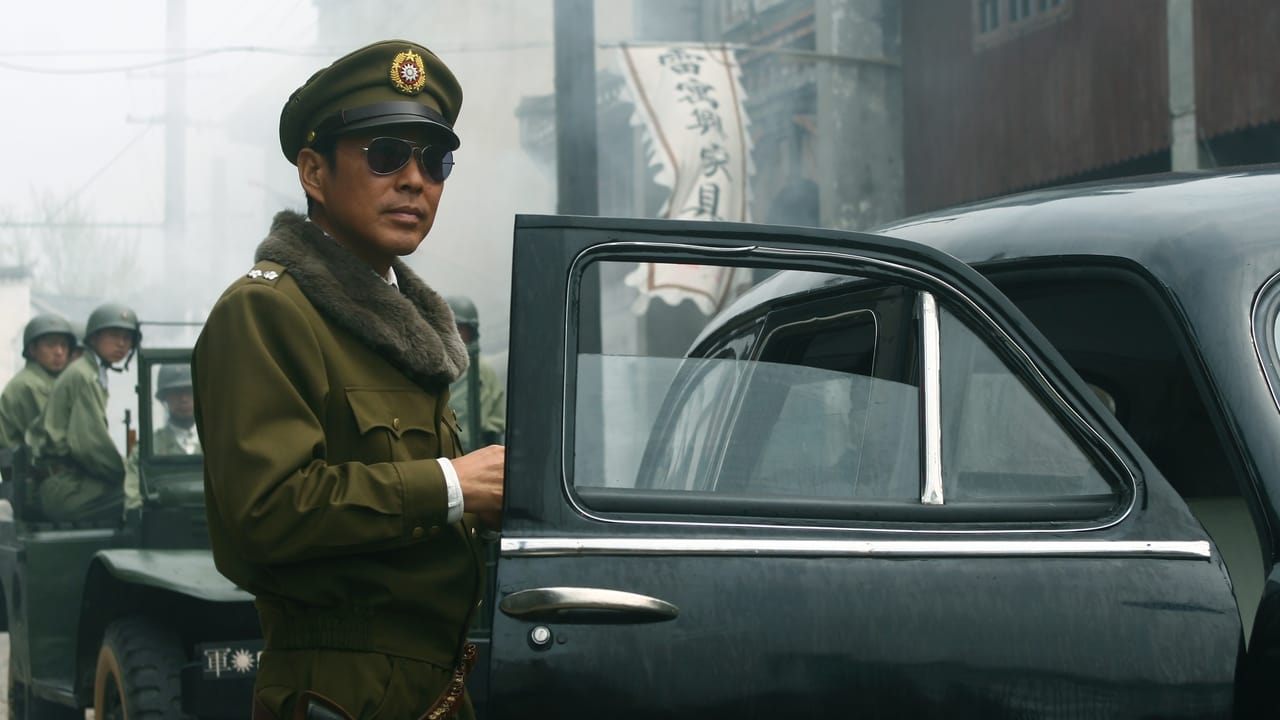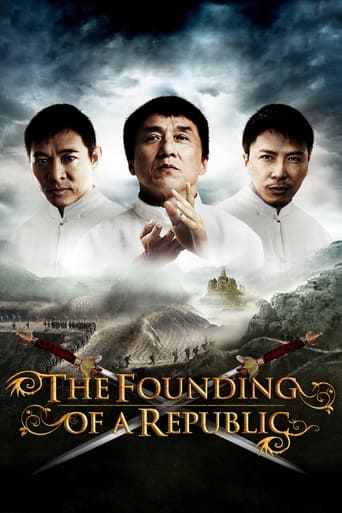Dorathen
Better Late Then Never
Dirtylogy
It's funny, it's tense, it features two great performances from two actors and the director expertly creates a web of odd tension where you actually don't know what is happening for the majority of the run time.
Catangro
After playing with our expectations, this turns out to be a very different sort of film.
Sarita Rafferty
There are moments that feel comical, some horrific, and some downright inspiring but the tonal shifts hardly matter as the end results come to a film that's perfect for this time.
tomofsweden
A Chinese film, financed by the government of China, about the formation of said republic. This is all out propaganda. What is interesting is that it's big budget, and it's on par with the many similar American propaganda films (from Hollywood). Stuff like Independence day, Black Hawk Down, Argo and so on. The acting is perfect. It's a star studded cast. They got all the biggest Chinese stars to do this. And you can tell. Both Jackie Chan and Jet Li have minor supporting roles. Their stars aren't bright enough to crowd out the better talent. So that's saying a lot. Great dialogue, as well. Anyway, cool to see a film like this where USA is the villain. While I'm in no way pro-Chinese. I do like variety and shifts in perspective. There's zero soul searching going on in this film. In this film Mao is the best guy ever. Truly loved and respected by all who know him. Although Chiang Kai Shek didn't actually kick a dog on screen... you just knew he did off camera. This is a bad man. I'm a history buff. So I've read biographies about all these people. They didn't need to do it this way. The Chinese communist party (ou tin the real world) already declared Mao an incompetent leader, and purged all his "henchmen". They did that in the 70'ies. So there should be zero contemporary controversy, in China, to do an accurate portrayal of both Chiang Kai Shek and Mao. But they chose to do it this way instead. Which took me a bit out of the drama. It's fun when the American ambassador is shown as a coward who doesn't stick up for his friends. Again... just nice to see, for a change, a high quality film that doesn't endlessly repeat the Hollywood messages of America's perfection. They do a quite good job dramatising, what essentially just is, a series of talks where a bunch of elderly men negotiate at various tables. There is a lot of smoking, and talking about smoking. I never figured out the symbolism of that. Or perhaps it just was historically accurate? The film does get a bit boring at times. There's a fun segment where Mao has taken sleeping pills but needs to get to safety in a bomb shelter. But he's high as a kite from the pills, and has no intention of cooperating with his handlers, who end up having to carry him by force on a stretcher (not a spoiler, since everybody who knows anything about history knows Mao survived). They do show some of the fighting. But this isn't a war movie. This film is only about the, behind the scenes, negotiating that later led to what became the formation of the republic. It spends a lot of time explaining why and how each member of the first Central Committee was elected. Which might be more fun if I knew more about recent Chinese history. Most of these names mean nothing to me. But it's pretty clear the viewers are supposed to be impressed. Which is another thing I like about it. Just like American propaganda films, it's shot for a domestic audience. It's obvious that this is shot for a Chinese audience, and only a Chinese audience. So they don't bother explaining, lots of stuff, you just have to know. I've read a lot of history, so I could mostly follow it. But far from everything. I did a lot of pausing and looking up stuff on Wikipedia. I must admit that I liked that aspect of it. It adds to the immersion, somehow. Despite it's flaws I did learn a lot, which I think is what's most important when it comes to historical dramas.
horse_power_9000
This is not a movie as such; but more of a propaganda film from some Chinese government brainwashing program. The films producer, the China Film Group (CFG) is actually a state owned media branch of the Chinese Communist Party (CCP), and are the sole importer/exporter of film in China. 'The Founding of a Republic' has to be the most classic example of communist propaganda to be produced by the CCP. Completely geared at glorifying the communist regime now in control of China, historical fact takes a back seat in this zombifying dissemination which is comparable to such films found in 1930s Germany. In the film the antagonists are the party who governed China during World War 2, the Kuomintang (KMT), while the protagonists are -yup you guessed it- the CCP; and not mention history's biggest mass murderin' glorious leader -Chairman Mao Zedong. And while the KMT ruled brutally, no one was prepared for the bloody reign of terror of Chairman Mao who left a body count greater than that of Hitler's and Stalin's combined. The regime has obviously spared no cost at producing a high quality production, but it can't hide the fact this film is cheesy and over dramatic as it attempts to incite ultra-nationalist sentiment in Chinese viewers. This film glorifies the dictator, it glorifies the regime, it glorifies the party. This government mouthpiece of a movie points the fingers at everyone else's wrongdoings, and condemns them for it, yet refuses to accept responsibility for or even acknowledge the crimes the communist party have committed, and indeed, are still committing. Whenever a film about a political party is made it can't amount to anything but propaganda and you just can't take it seriously. And less so when the direction and dialog is corny and the 'facts' are inaccurate and over-dramatized, and as the 2008 Olympics have taught us the regime in 'The Peoples Republic' are not shy to boast of their glory yet completely ignore their own heinous crimes.
kangshifu
i think if someone is to watch a movie, they should enjoy it. i mean you paid for it might as well. and not bring up your own opinion about the country you live in. a government cant make EVERYONE happy and for china to rise so high in this world means its doing things right. like the guy above. this is a movie review, not your personal preference of what your prefect government should be. as i am Chinese i am proud to see what my own country has become and was very excited to see this movie. i have seen a lot of china vs. taiwan films and TV series. and i've got to say this was one of the best ones i have seen. and i clearly don't think china needs to make more propaganda film to make people like them. and to be Chinese and not understand the culture...that person should be very ashamed of himself . ^
Harry T. Yung
I generally do not take motion pictures too seriously (although I fully respect artistic achievements in them). TFOAR has painted as favourable a picture of Mao Zedong as you can see anywhere. I do not have a problem with that, simply shrugging it off with "It's only a movie". And if it is going to do this anyway, the period covered by the movie would certainly be a good one to do it with.On the other hand, this movie has come a long way from the heavy-handed political propaganda-type of movies usually produced by Mainland China. It is quite palatable, with what you can almost (but not quite) call minimalism approach. You do not find contrived vulgarization of the KMT or exaggerated glorification of the Communists. It fact, the first hour (i.e. about 2/5) of the movie was so much like a dull documentary that I had difficulty staying awake. But as it became more focuses and dramatic conflicts intensified, I got more and more interested.The first thing you would notice is the almost complete absence of gritty battle scenes, particularly when the story is essentially about the military struggle between the KMT and the Communists for the control of post-WWII China. The focus of this movie is on the political background, with characters and dialogue aplenty. The fateful, decisive Wei Hai Battle is all but briefly mentioned, after which the mood turns even lighter. The changing point is a playful scene of two official photographers setting up their camera at the unassuming entrance of a humble house and capturing the arrival of key personalities (a complete "who's who") to a meeting that sets the course of the founding of the PRC.The ominous elements is given almost exclusively to the KMT side, focusing mainly on Chiang Kai-shek who is depicted, however, with surprising generosity. The several scenes between him and his son Cheung Ching-kuo verge on tenderness, while the latter is even given an impeccably heroic persona. The only really dark side is Chiang Senior's order to secretly eliminate over a dozen Communist supporters on the eve of his fled to Taiwan. The harshest moment on the Communist side is, ironically, at the most glorious juncture, the victors' procession into Beijing. The rousing reception is led by an "old soldier" (not literally in age) portrayed brilliantly by the inimitable Liu Ye, representing an army that suffered horrendous casualties. The bitterness in this old soldier's dramatic salute in left for the audience to interpret.Overall, however, the movie bathes in a light, almost cheerful, atmosphere, which is totally understandable as it is made to celebrate the 60th anniversary of the foundation of the PRC. Who would want to recall blood and pain on a birthday party? It concludes with the "soft" history of the selection of the national anthem and flag for the new republic.The single most remarkable thing about this movie is Tang Guoqiang who has made a career out of portraying Mao. When, in the inserted newsreels, the real Mao appears, you wouldn't think it's a different person from what you see in the movie. He is just that good. In this movie he did a marvellous job in bringing out the charisma of this charismatic leader.It would be a sin not to mention the two women in this movie, Xu Qing playing Soong Ching-ling (Madam Suen Yat-san) and Vivian Wu Soong May-ling (Madam Cheung Kai-shek). While I am not familiar with Xu, her grace and poise I simply cannot think of another actress that can match. But my own favourite is Vivien Wu who would be better known to the global audience and played the same role in "The Soong sisters" (1997), but at a younger age. These two complement the superb performance of Tang and brighten up this movie. As to the huge cast of cameos of who's who in the Chinese movie scene, more than enough has been said, especially by incompetent movie reviewer who don't know what else to say.

